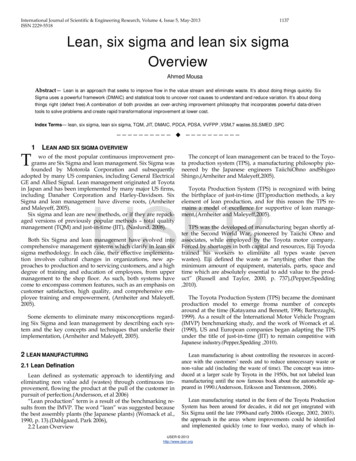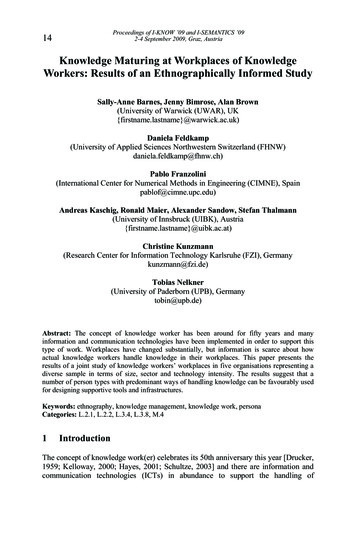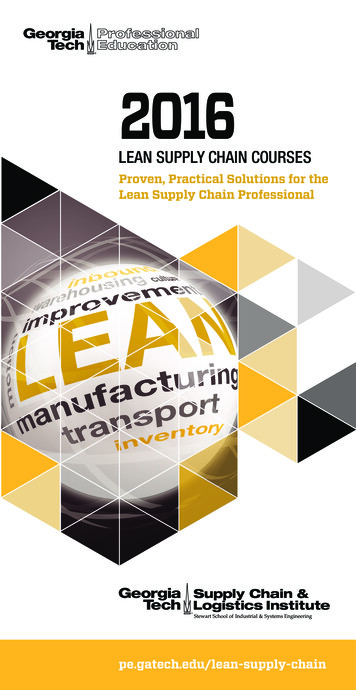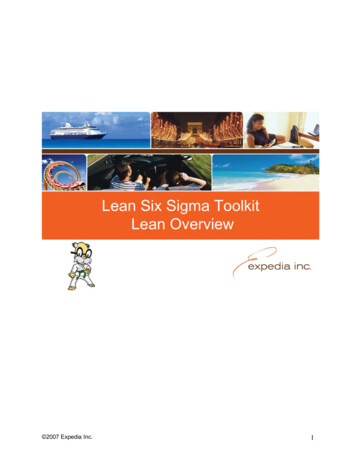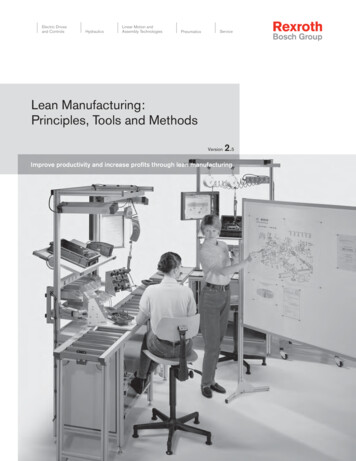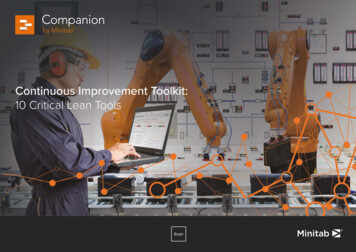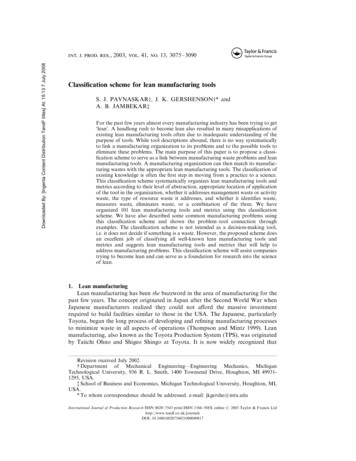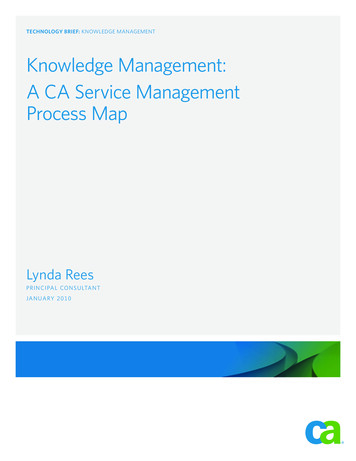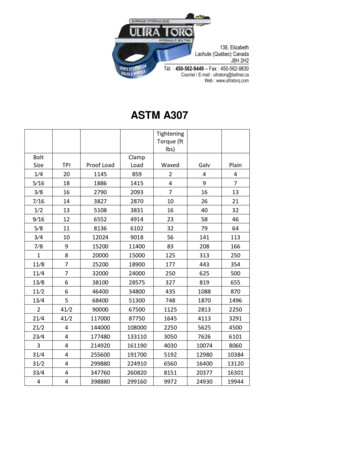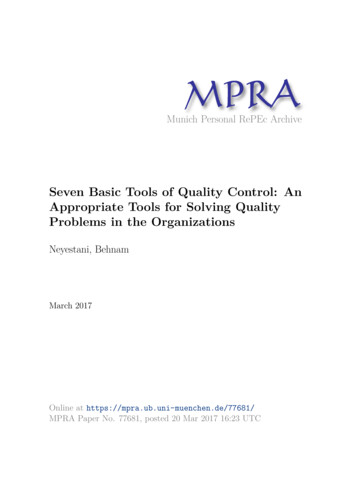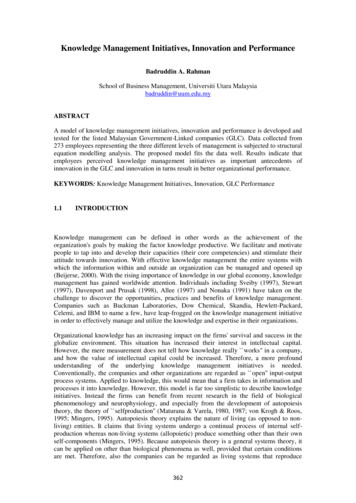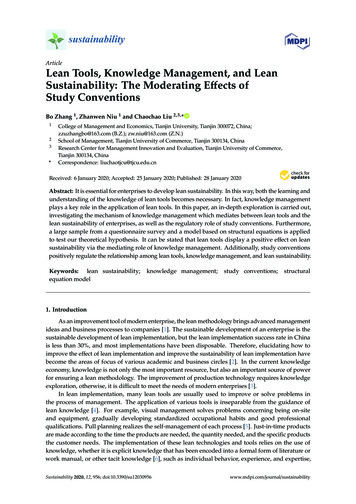
Transcription
sustainabilityArticleLean Tools, Knowledge Management, and LeanSustainability: The Moderating Effects ofStudy ConventionsBo Zhang 1 , Zhanwen Niu 1 and Chaochao Liu 2,3, *123*College of Management and Economics, Tianjin University, Tianjin 300072, China;zzuzhangbo@163.com (B.Z.); zw.niu@163.com (Z.N.)School of Management, Tianjin University of Commerce, Tianjin 300134, ChinaResearch Center for Management Innovation and Evaluation, Tianjin University of Commerce,Tianjin 300134, ChinaCorrespondence: liuchaotjcu@tjcu.edu.cnReceived: 6 January 2020; Accepted: 25 January 2020; Published: 28 January 2020 Abstract: It is essential for enterprises to develop lean sustainability. In this way, both the learning andunderstanding of the knowledge of lean tools becomes necessary. In fact, knowledge managementplays a key role in the application of lean tools. In this paper, an in-depth exploration is carried out,investigating the mechanism of knowledge management which mediates between lean tools and thelean sustainability of enterprises, as well as the regulatory role of study conventions. Furthermore,a large sample from a questionnaire survey and a model based on structural equations is appliedto test our theoretical hypothesis. It can be stated that lean tools display a positive effect on leansustainability via the mediating role of knowledge management. Additionally, study conventionspositively regulate the relationship among lean tools, knowledge management, and lean sustainability.Keywords: lean sustainability;equation modelknowledge management;study conventions;structural1. IntroductionAs an improvement tool of modern enterprise, the lean methodology brings advanced managementideas and business processes to companies [1]. The sustainable development of an enterprise is thesustainable development of lean implementation, but the lean implementation success rate in Chinais less than 30%, and most implementations have been disposable. Therefore, elucidating how toimprove the effect of lean implementation and improve the sustainability of lean implementation havebecome the areas of focus of various academic and business circles [2]. In the current knowledgeeconomy, knowledge is not only the most important resource, but also an important source of powerfor ensuring a lean methodology. The improvement of production technology requires knowledgeexploration, otherwise, it is difficult to meet the needs of modern enterprises [3].In lean implementation, many lean tools are usually used to improve or solve problems inthe process of management. The application of various tools is inseparable from the guidance oflean knowledge [4]. For example, visual management solves problems concerning being on-siteand equipment, gradually developing standardized occupational habits and good professionalqualifications. Pull planning realizes the self-management of each process [5]. Just-in-time productsare made according to the time the products are needed, the quantity needed, and the specific productsthe customer needs. The implementation of these lean technologies and tools relies on the use ofknowledge, whether it is explicit knowledge that has been encoded into a formal form of literature orwork manual, or other tacit knowledge [6], such as individual behavior, experience, and expertise,Sustainability 2020, 12, 956; ability
Sustainability 2020, 12, 9562 of 20which are all important factors for the use of lean tools [7]. The process of using lean tools is essentiallya process of knowledge creation and flow. The use of knowledge management to conduct lean activitiesin production practice requires basic knowledge of lean methodology by the relevant personnel. Atthe same time, knowledge absorption, transformation, and storage can be completed in the course ofpractice [8]. The application of lean tools will also promote the transformation, activation, and use ofknowledge to a certain extent.Lean implementation is the elimination of waste through preventive measures so as to reduceenvironmental pollution while reducing costs. Lean product design automatically leads to greenerproducts, and green product design ensures efficiency in the product development phase.The purpose of lean is the application of a lean implementation system in the enterprise, which isa deep transformation of the enterprise system. This transformation is not to transform the existingsystem and process into a better one, but to build a cultural atmosphere for independent improvementwithin the enterprise. In other words, the enterprise needs to implant a gene that can continuouslysearch for the best and form a dynamic mechanism. After the static mechanism is built, it can be run,while lean requires the establishment of the habit of optimization. It can be seen that lean emphasizesthe cultivation of people’s ability and habits, as well as the formation of corporate culture, which arethe sustainability of lean.Therefore, this paper defines lean sustainability from two aspects: from an environmentalperspective, lean sustainability is the future development stage of lean implementation, in whichenterprises pursue long-term environmental harmony and focus on the improvement of social value.Lean sustainability is to help enterprises change their operations to reduce waste, emissions and waste ofresources. From the perspective of implementation, lean sustainability is defined as the establishmentof the concept of long-term implementation of lean, the use of lean for in-depth transformation,continuous optimization, and the establishment of an independent implementation of lean culturalatmosphere within the enterprise.The process of lean implementation is the management process of the transfer, sharing, integration,and transformation of lean knowledge in an enterprise. Knowledge management is an important areaconcerning the improvement of lean sustainability [9]. Recently, lean sustainability and knowledgemanagement have gradually become common areas of concern for practitioners and academics. Therehave been many independent studies on the application of lean tools and knowledge management, bothat home and abroad [10]. However, few scholars combine the application of lean tools with knowledgemanagement to carry out sustainability analysis. Based on the process of lean implementation andits characteristics, this paper studies the role of knowledge management between lean tools and leansustainability, establishing an internal relationship model between knowledge management, leantools, and lean sustainability [11]. Additionally, the paper also studies the moderating effects of studyconventions on the use of lean tools.The article is structured as follows: a literature review is conducted in the next section. In thethird section, on the basis of analyzing the theoretical background among lean tools, knowledgemanagement, and lean sustainability, the hypothesis model of lean knowledge management ability isextracted. In the fourth section, the research methods are given. Then, the research result is verified bya case study. The conclusions and suggestions for future research are given in the final section.2. Related WorkIn order to grasp the current research status of knowledge management in lean implementation,this paper took lean as a keyword and used the Science Citation Index Expanded as a source ofretrieval [12]. A total of 341 full-text academic articles were retrieved [13]. After excluding articleswith short reviews, book reviews, and content discrepancies, 277 articles were finally obtained [14].Between them, 65 were empirical articles. After a systematic reading of the articles mentioned, it wasrevealed that the principles and practices of lean production have been discussed by academics fordecades. In fact, lean research began in the 1970s, but early researchers did not define lean in this
Sustainability 2020, 12, 9563 of 20instance. Sugimori published his first academic paper on the Toyota Production System (the prototypeof lean production) in 1977 [15]. In 1988, Krafcik used "lean" to describe the manufacturing technologyof Toyota for the first time [16]. In 1990, Womack et al. published "the machine that changed theworld." In its discussion, the concept of lean production involves product development, procurement,the supply chain, production, and sales, among other things [17]. In 1996, Womack et al. proposedthe concept of lean thinking, and raised the guiding principles of lean production to the corporatestrategic level [18]. Since then, the growth of research on lean production has experienced a fastincrease. In addition to manufacturing, other industrial sectors have applied lean thinking in order totransform their internal and external operations in order to gain competitive advantages [19]. Fromthe perspective of research content, the previous studies on lean have been mainly divided into twodirections, further explained below.The first direction is traditional enterprise operation and production management, focusing onthe value realization of lean production [20]. The second direction is to consider lean productionas a paradigm for enterprise process optimization, in order to analyze the implementation of leanproduction in the given enterprise and to pay more attention to the internal organizational elements [21].As one of the important factors affecting lean performance, the role of knowledge resources in theprocess of promoting lean production has gradually increased in interest [22]. Among the 65 empiricalresearch studies of lean methodology, there were nine articles related to knowledge management. Thecontent is shown in Table 1.
Sustainability 2020, 12, 9564 of 20Table 1. Empirical study of knowledge management in the application of lean tools.NO.Time and AuthorsResearch Content12017Amir Honarpour and AhmadJusohSampleResearch MethodsPropose a reciprocal causation between TQM and knowledgemanagement [23].22017Yiwei Gong and VincentBlijlevenThe role of Lean principles in supporting knowledge management inIT outsourcing relationships [24]Six semistructured interviews atdifferent organizational levelsCase study32017M. FatihAcar, MerveTarim,HalilZaim, SelimZaim andDursunDelenFind the level and direction of the relationship between ERP andknowledge Management in the context of operational and financialperformance [25].In total 163 responses arecollected from TurkishmanufacturingcompaniesStructural equationmodeling42017MahaMohammed Yusr,SanySanuriMohd Mokhtar,Abdul Rahim Othman andYatySulaimanInvestigate the effect of applying total quality management (TQM)on enhancing knowledge management processes. They also examinethe relationship between knowledge management and innovationperformance in the Malaysian manufacturing sector [26]In total 800 medium to largemanufacturing companies listedin the Federation of MalaysianManufacturersPartial least square52015Satish Tyagi, XianmingCai, KaiYang and Terrence ChambersEstablishes a framework to create knowledge in the productdevelopment environment, and then systematically demonstrateshow these 10 lean tools and methods conceptually fit into and play asignificant role [27]SECI model62013LudvigLindlof, Bjorn Soderbergand MagnusPerssonEstablishes a link between the concept of lean product developmentand the field of knowledge management [28].SECI model72013Shaofeng Liu, Mike Leat,Jonathan Moizer, Phil Megicksand DulekhaKasturiratneThis paper proposes a decision-focused knowledge frameworkincluding a multi-layer knowledge model, a knowledge matrix forknowledge elicitation, and a decision tree for the design of theknowledge base. A knowledge system for lean supply chainmanagement has been developed using artificial intelligence systemshells VisiRule and Flex [29].Multi-layerknowledge model;82011Bradley R.Staats, David JamesBrunner, David M. UptoncDocument the influence of the lean initiative on internal processesand examine how the techniques affect learning by improving bothproblem identification and problem resolution [30].92010GopeshAnand, Peter T. Wardand Mohan V. TatikondaThis research develops a conceptual model for predicting the successof process improvement projects as a result of knowledge-creationpractices employed in the projects [31].Joint varianceanalysis methodAn Indian softwareservices firmCase studyHierarchicalregression
Sustainability 2020, 12, 9565 of 20Lean implementation is an important means of production. Its role in knowledge management isself-evident [32]. However, in the actual lean practice process, relevant management personnel haveobvious deficiencies in mastering lean knowledge [33]. Wandahl conducted a literature review andcase study of lean implementation and found that 80% of people involved in lean-related work did nothave lean knowledge and only 6% of staff knew and determined that they were using lean tools orlean production technology [34]. Brianna studied the common misconceptions in lean concepts, whichwere largely responsible for poor lean methodology implementations [35]. Therefore, strengtheningthe research and attention of knowledge here will lead to the successful implementation of leansustainability. This means that knowledge is a crucial factor in the process of lean sustainability.On the basis of the previous research, the knowledge management process was divided into threebasic processes, namely, knowledge acquisition, knowledge integration, and knowledge application.This paper studies the impact of these three basic processes on lean performance. At the same time,it studies the effect of the adjustment of study routines on knowledge management. Specifically, themain research questions in this paper are as follows: How does the application of lean tools influencelean sustainability through the role of knowledge management? How does the application of leantools affect knowledge management and lean sustainability in terms of study
Lean Tools, Knowledge Management, and Lean Sustainability: The Moderating E ects of Study Conventions Bo Zhang 1, Zhanwen Niu 1 and Chaochao Liu 2,3,* 1 College of Management and Economics, Tianjin University, Tianjin 300072, China; zzuzhangbo@163.com (B.Z.); zw.niu@163.com (Z.N.) 2 School of Management, Tianjin University of Commerce, Tianjin 300134, China 3 Research
